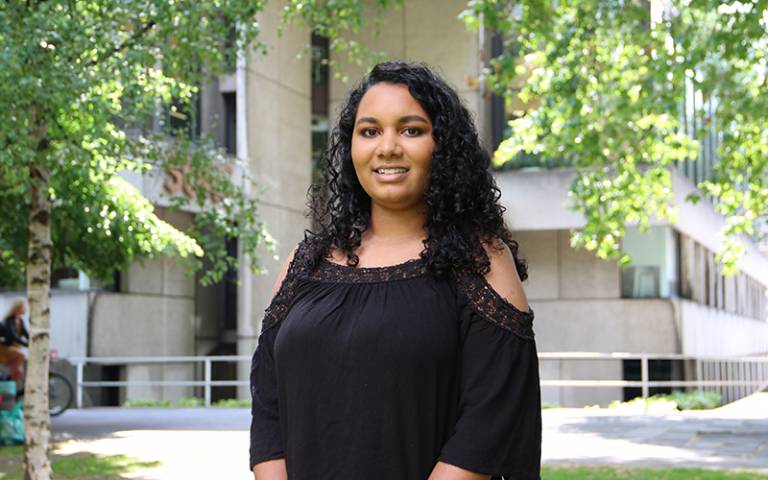Guyanne is a Social Sciences BSc student at IOE, UCL's Faculty of Education and Society. She tells us about the benefits of a broad degree and why London is the perfect laboratory for social studies.

What was your first impression of UCL?
I was quite overwhelmed by UCL as a whole, because it's a big university with lots of staff and students. I liked that the Social Sciences department is located in the main IOE building as it made finding classes and accessing facilities easier! I also appreciated the small class size as it meant I could make core friends within my degree and I got to know my fellow students pretty well by the end of the first year.
What made you choose the Social Sciences BSc programme at UCL?
I chose to study Social Sciences because I really had no clue what I wanted to do as a career. I hadn't studied Psychology or Sociology before, the keystone subjects of the degree, but I was interested in politics, communications and societal processes. I thought this degree would be a good fit for me as someone who likes to have a breadth of knowledge and the opportunity to study a range of topics. I was also drawn to the fact that the degree aims to not only highlight social problems, but also to equip students with the tools to find solutions.
What have you found most valuable about your degree programme?
I think the most valuable taught aspect of my degree is the focus on quantitative and qualitative research methods. Although admittedly they can be quite arduous and monotonous to learn, I feel the skills learnt in those modules are the most transferable for any job in any field.
In addition, taking a study abroad year was one of the best decisions I have ever made. By studying at the National University of Singapore, I was rewarded with so many new friends, unforgettable memories, new skills and life lessons. During that year, I had the opportunity to travel around South East Asia, experience a more campus-based community bubble and take courses that aren't available at UCL.
“What do you do when you're not studying?
In my second year I created the UCL Social Sciences Society. I really wanted to create a network for all Social Sciences students to mingle and explore more aspects of the degree. Creating the society is one of my greatest accomplishments at university.
Tell us what it's like to live and study in London.
I did my GCSEs and A Levels in the Seychelles so moving to London was a big step for me. I can see how London can feel overwhelming at times because it is constantly busy and there are always reports of crimes; it's also very expensive, particularly travelling and rent.
But, still, London offers so much. There are all the free museums, parks, cafes, and so on. I also think there are a lot of opportunities to get jobs, internships, voluntary experience and more.
Mostly I love how diverse London is. You can see people from all walks of live just sitting on your bus journey home. As a social scientist, I think this is the perfect place to critically analyse social issues and interpret social change, because it can all be witnessed first-hand in London.
What would you say to somebody thinking of applying to UCL to study your course?
To anyone considering doing Sociology, Psychology, PPE, Politics or any of the other social science, I would definitely tell them to consider doing this course. The Social Sciences BSc at UCL is a brilliant blend of all the social sciences and give you all the tools to excel in researching and/or practicing in any related discipline. I love how the course is interdisciplinary and each module can feed into another one.
The teachers are very supportive and are all experts in their field. I also appreciate that the classes are between 90-110 students, including the quantitative methods strand, which means that all the students get to know each other well and can have meaningful discussions on class topics.
Lastly, in today’s social and political climate where polarisation across a number of issues is increasing, social scientists are needed to understand the drivers of social change and how to bring people together.
 Close
Close


